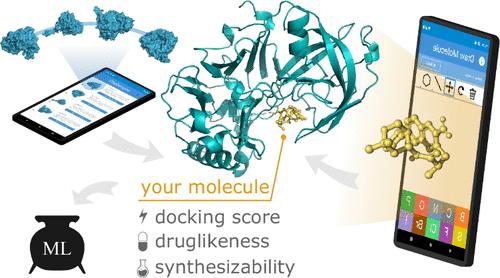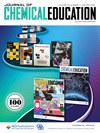MedChem Game: Gamification of Drug Design
IF 2.5
3区 教育学
Q2 CHEMISTRY, MULTIDISCIPLINARY
引用次数: 0
Abstract
The growing importance of computer methods in drug discovery encourages greater accessibility of cheminformatics tools. The methods that enable automated analysis of molecules, e.g., molecular docking or machine learning models, remain out of reach for nonexpert computer users. To address the shortage of easily accessible tools that can be used to practice drug design, we created MedChem Game, an Android application that uses gamification and artificial intelligence to help users learn about medicinal chemistry and design new small-molecule drugs. Our application includes a simplified molecule drawing tool used to propose new drug candidates that can be docked to one of the four target proteins currently implemented in the game. Additionally, we have implemented a 3D ligand–protein viewer so that players can inspect molecular docking results. All the designed compounds are stored in a database with the sequence of operations the user performs. The key component of our system is a continuously trained deep generative model that utilizes user-developed compounds to improve the quality of generated molecules. Learning directly from the expertise and creativity of players, including medicinal chemists, could help advance computer-aided drug design in the future. Moreover, MedChem Game could be a useful supplement to courses on small-molecule drug design.

MedChem 游戏:药物设计游戏化
计算机方法在药物发现中的重要性与日俱增,这促使人们更容易获得化学信息学工具。对于非专业计算机用户来说,分子对接或机器学习模型等实现分子自动分析的方法仍然遥不可及。为了解决缺乏可用于药物设计实践的易用工具的问题,我们创建了 MedChem Game,这是一款安卓应用程序,利用游戏化和人工智能帮助用户学习药物化学知识并设计新的小分子药物。我们的应用程序包括一个简化的分子绘制工具,用于提出新的候选药物,这些候选药物可以与游戏中目前实现的四个目标蛋白质之一对接。此外,我们还提供了一个三维配体-蛋白质查看器,以便玩家查看分子对接结果。所有设计的化合物都存储在一个数据库中,其中包含用户执行的操作序列。我们系统的关键组成部分是一个持续训练的深度生成模型,它利用用户开发的化合物来提高生成分子的质量。直接从玩家(包括药物化学家)的专业知识和创造力中学习,有助于推进未来的计算机辅助药物设计。此外,MedChem Game 可以作为小分子药物设计课程的有益补充。
本文章由计算机程序翻译,如有差异,请以英文原文为准。
求助全文
约1分钟内获得全文
求助全文
来源期刊

Journal of Chemical Education
化学-化学综合
CiteScore
5.60
自引率
50.00%
发文量
465
审稿时长
6.5 months
期刊介绍:
The Journal of Chemical Education is the official journal of the Division of Chemical Education of the American Chemical Society, co-published with the American Chemical Society Publications Division. Launched in 1924, the Journal of Chemical Education is the world’s premier chemical education journal. The Journal publishes peer-reviewed articles and related information as a resource to those in the field of chemical education and to those institutions that serve them. JCE typically addresses chemical content, activities, laboratory experiments, instructional methods, and pedagogies. The Journal serves as a means of communication among people across the world who are interested in the teaching and learning of chemistry. This includes instructors of chemistry from middle school through graduate school, professional staff who support these teaching activities, as well as some scientists in commerce, industry, and government.
 求助内容:
求助内容: 应助结果提醒方式:
应助结果提醒方式:


